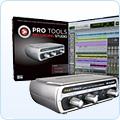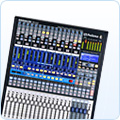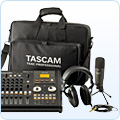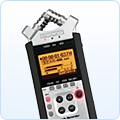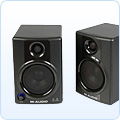
|
 |
 |
 |
Music Gear Power Search |
A Few Words on the Order of Recording
Usually, drums and percussion instruments are the first instruments to be recorded. The reasons for this: drums are usually the rhythm leaders; it is much easier for musicians recording later tracks to keep to the beat of the drums.A drummer would find it very difficult to play along with a backing track recorded without percussion, due to the likely variations in the musicians' tempo. Furthermore, in order to accurately keep to a pre-established rhythm, a drummer would need the sound of the other instruments to be very loud to compete with their drum kit; apart from the possibility of the drum microphones picking up the sound of the other instruments from the drummer's headphones, prolonged exposure to such volume might very well damage their hearing. Also, it allows the drums to be recorded for a few seconds, then looped. Click tracks are also often used as the first sound to be recorded, especially when the drummer isn't available for the initial recording, and/or the final mix will be synced with motion picture and/or video images.
Computer Recording
Microphones & Accessories
Mixers & Accessories
Multitrack Recorders Portable Recorders Studio Monitors
Also, though the drums might eventually be mixed down to a couple of tracks, each individual drum and percussion instrument might be initially recorded to its own individual track. The drums and percussion combined can occupy the largest number of tracks utilized in a recording. This is done so that each percussion instrument can be processed individually for maximum effect. A common percussion effect is the slow back and forth panning of a percussive instrument's sound in the stereo field from the left to the right channel in a song. Equalization (or EQ) is often used on individual drums, to bring out each one's characteristic sound.
The last tracks to be recorded are usually the vocals (though a temporary vocal track might be recorded early on either as a reference or to guide subsequent musicians, this is sometimes called a "Ghost Vocal" or "Scratch vocal"). One reason for this is that singers will often temper their vocal expression in accordance with the accompaniment.¹
Top of Page >>
Copyright © 2004- by Ace Toscano. All rights reserved.

